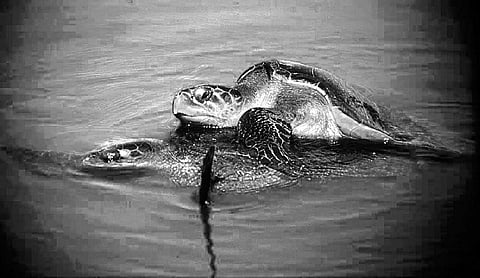

KENDRAPARA: Pairs of mating Olive Ridley sea turtles have begun emerging on seawaters off Gahiramatha Marine Sanctuary in the district, marking the beginning of breeding and nesting season of the endangered turtles.
Hundreds of turtles are mating on the surface of the sea water at present. The Olive Ridleys usually start their mating in the sea near their preferred nesting coast in the first week of November, said Subrat Kumar Patra, Forest Range Officer of Gahiramatha Marine Sanctuary.
At the end of mating season, most male turtles return leaving behind the female turtles to lay their eggs. The female turtles virtually invade the nesting beaches in the dead of night for laying eggs in the sand pits dug by them, the phenomenon described as Arribada. After laying eggs, the turtles leave the nesting ground and return into deep sea water. Hatchlings emerge from these eggs after 45 to 60 days. It is nature’s rare phenomenon where the babies grow without their mother, said Patra.
The turtles repeat the journey every year, always to return to the same beach in order to lay their eggs and reproduce where they were born. The protected Gahiramatha beach is the world’s largest nesting site for Olive Ridleys. Olive Ridleys are known for their Arribadas, where half a million turtles come ashore to lay their eggs, added the forest officer.
Around 52,000 turtles laid eggs from March 12 to March 19 last year at the Nasi-1 and Nasi-2 islands within the sanctuary. The sea turtle is the most important attraction at this coast, in fact this species was the main reason for declaring Gahiramatha as a marine sanctuary in 1997, said the forest officer.
Besides Gahiramatha, the turtles also visit Rushikulya and Devi river mouths in large numbers every year for mass nesting.
Meanwhile, measures have been initiated to protect these mating turtles in the sea. Fishing has been banned within a distance of 20 km from the coastline in the marine sanctuary from November 1 to May 31 where the turtles congregate. Nearly 110 fishermen have been arrested and 15 boats seized since November 1 on charges of illegally fishing in the marine sanctuary, said Patra.
The Forest Department established hatcheries at Aagarnasi, Pentha and Babubali within Gahiramatha and the forest guards were directed to collect eggs from the pits and put in the hatcheries to protect the eggs from predators like dogs, wild boars, jackals and birds. All the hatcheries are covered with plastic nets to prevent the entry of any predators, said the forest officer.